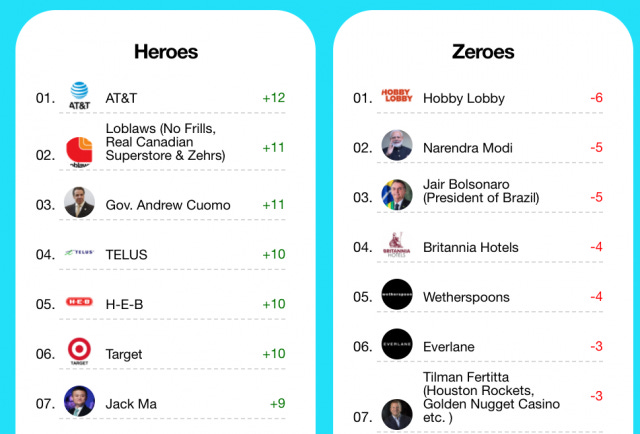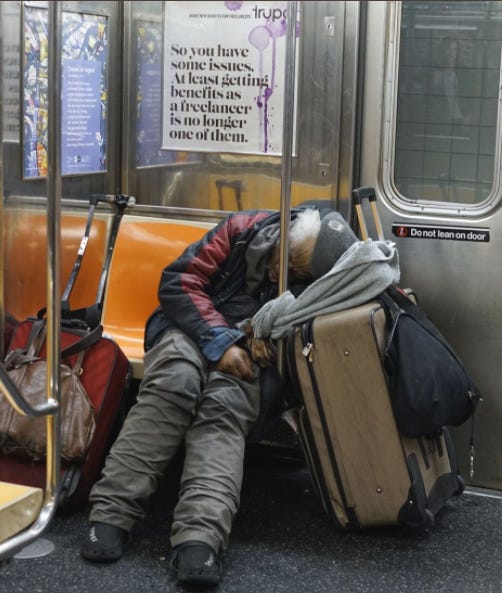#137: What did you do? The shape of the next normal, finding the stories, greenwashing as gaslighting, and making remote meetings inclusive.
It's April 25th!

In this edition of The World's Best Newsletter:
1. To create change, find the stories.
2. The shape of the next normal
3. What did you do?
4. How to make remote meetings inclusive
5. Greenwashing and gaslighting on Earth Day
6. More on Steak-umm's "bizarre, truth-bombing" Twitter account
7. Quote of the week: So you have some issues...
Let's do it.
1. To create change, find the stories.
You know Cecile Richards as the former president of Planned Parenthood. She is now with Supermajority, a group harnessing the political activism of women. Her advice here is pertinent for marketers, of course, but for anyone hoping to create change - social change, behavior change... find the stories.
The only things people remember are stories.
That’s it.
It’s a lesson my mother, Ann Richards, taught me. She was the first woman to be elected in her own right as governor of Texas. It’s a lesson I saw proven time and time again during my 12 years as president of Planned Parenthood.
... My mom used to say, "If my momma back in Waco can’t understand you, what you are saying isn’t being heard."
There is no better way to make yourself understood than through the most time-honored method of communicating: sharing stories.
Read the full article for examples.
PS: Highly recommend her book, Make Trouble. It's a primer on organizing, activism, and a guide to passionate change-making.
2. The shape of the next normal
H/T to Kathleen Schaub of IDC for sharing this McKinsey piece this week. She writes:
I'm particularly interested in the need for increased resilience. Has the drive for efficiency taken so much slack from the system that we can't be responsive to shocks (or opportunities)?
From the piece:
The question is, ‘What will normal look like?’ While no one can say how long the crisis will last, what we find on the other side will not look like the normal of recent years.”
Takeaways for me:
3B+ people live in countries whose borders are now totally closed to nonresidents.
Three growth areas: digital commerce, telemedicine, and automation.
As businesses accept dollars from taxpayers, "The public will expect—indeed, demand—that their money be used for the benefit of society at large. This raises complicated questions. What does it mean for businesses to do right by their employees and customers?"
Flexible work - critical for some - is now the norm, and these practices may stick.
"As businesses are forced to do more with less, many are finding better, simpler, less expensive, and faster ways to operate."
Or, we could face less prosperity / slower growth / widening inequality... The firm notes it's likely to be somewhere in the middle. It's up to us. Full piece here.
3. What did you do?
One more quote from that McKinsey piece:
"The coronavirus could be the biggest global challenge since World War II. In the wake of that conflict came the question: “What did you do during the war?” That question will be asked, forcefully, of both government and business, once the COVID-19 battle has been won. Business leaders need to ask it of themselves now."
There's now a resource keeping track of this question, via David Armano of Edelman:

DidTheyHelp.com calculates how a company or celebrity behaves during the Coronavius pandemic, including a list of heroes and zeroes:

"We award a point for each positive action or good deed a company/person takes to support people during the coronavirus pandemic."
Whether consumers use this resource to make future purchase decisions or not, the truth this illuminates is that eyes are on the ways brands now act during the crisis.
I don't know what counts as a "positive action" per Edelman, but for me the actions I'm looking at are related to:
treatment their own employees
the safety of their customers
their use of public funds
All are indicative of a brand's true values.
And, meme culture is on to this:

:)
4. How to make remote meetings inclusive
Thank you to product design / development firm thoughtbot (s/o to CMO Lindsey Christensen) for this important guide.
"...as we shift to working remotely, we can practice strategies to help make our meetings, processes, and cultures inclusive."
Some tips for remote meetings:
Use chat to line up who speaks next
Switch who takes notes
After you speak, let others speak
Use a calendar app to appreciate strange schedule needs now
Avoid silos, invite all relevant people
Work within boundaries
Slow down, over-communicate
I especially love their use of the Slack bot to detect exclusionary language.
Full guide here.
5. Greenwashing and gaslighting on Earth Day
It's one of the original forms of brands pandering - Greenwashing, the use of eco-friendly phrases or branding to align with the public's growing desire for sustainable products without meaningful action.
Watch this short video for a 5 min recap of how brands greenwash (see it on Facebook or LinkedIn)...

My full article here has 10 examples: 7 instances of greenwashing and 3 examples of legitimate action, plus a new spectrum to consider campaigns against:

6. More on Steak-umm's "bizarre, truth-bombing" Twitter account
Via WashPo: (non-paywall version here, but please consider funding some legitimate journalism in a paid subscription even if not to WashPo...)
Quick facts:
The account is run by Allebach Communications of Souderton, PA
The sliced-beef company wanted to "reach a younger audience"
The 28 year old son of the firm's owner writes these posts
I'm not quite on board... yes, I get the authenticity thing a la Wendys, Taco Bell, Planters ... but to say their posts are unrelated to the company itself is an understatement. The personal rants of one guy has less than nothing to do with building brand consideration for a frozen steak product used to make Philly cheesesteaks at home.
The marketer in me is wary of celebrating this.
But the absurdist in me loves it :)
7. Quote of the week: So you have some issues...
This gave me perspective this week. Please look at the placement and copy of this ad vs the dire situation of the person beneath it:

This incredibly compelling piece of photojournalism comes from this Tweet, promoting a Reuters piece about how New York's subway has become a place of safety for the city's homeless who feel unsafe in shelters due to the virus.
Afraid of the coronavirus in the shelters, many are sleeping on ghost trains and on platforms abandoned by almost everyone else during the lockdown... As a pandemic races through New York, killing some 14,000 people in the city alone, all the frantic layers of everyday life are pulled away. The homeless – always there, but usually invisible – are now in sharp relief.
I hope you find some peace this weekend, and have a safe week ahead.
Katie Martell
Website | LinkedIn | Twitter
>> Share this newsletter on Twitter, or LinkedIn <<
Upcoming event:
Monday 4/27 at 1:00pm ET, grab some small weights and join an intro-to-boxing class with my amazing wife, certified Personal Trainer Martine Martell.
It's part of Alyce’s YOUniverse event. Check out the full lineup including puppets and cocktails...
Then find me on Tuesday 4/28 at 12pm ET on a panel about why the future of B2B includes personal experience with:
Amy Spurling, CEO, Co-Founder at Compt
Ryan Bonnici, CMO at G2
Ellie Mirman, CMO at Crayon
MK Getler, Director of Customer Marketing at Alyce


